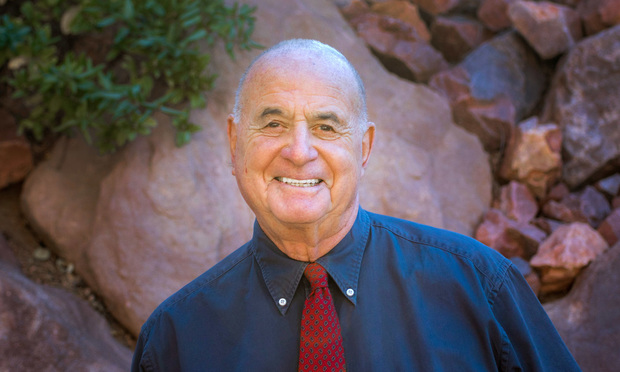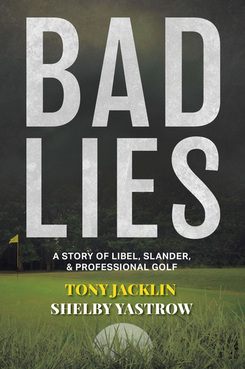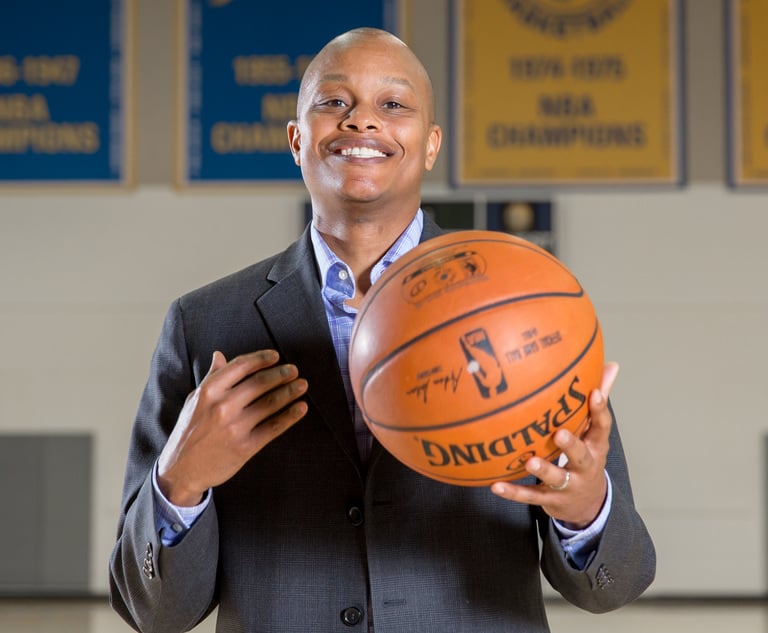Ex-GC of McDonald's and Former Golf Pro Co-Author New Novel About Libel, Justice
The funny and folksy former McDonald's GC Shelby Yastrow, who can spin a tale in answer to any question, spoke with Corporate Counsel Tuesday as his new book went on sale.
May 02, 2018 at 05:49 PM
6 minute read
 Shelby Yastrow. Photo Credit: Susan Baker-Ory.
Shelby Yastrow. Photo Credit: Susan Baker-Ory. It's anything but par for the course: retired McDonald's Corp. general counsel Shelby Yastrow and former pro-golf champion Tony Jacklin have collaborated on a new courtroom suspense novel.
The book has a corporate villain replete with a battery of high-priced lawyers. Not Big Oil. Not tobacco … but a magazine.
The funny and folksy Yastrow, who can spin a tale in answer to any question, spoke with Corporate Counsel Tuesday as the new book went on sale. He said the novel, “Bad Lies,” tells the fictional story of successful pro golfer Eddie Bennison and his legal battle with a major golf magazine that shatters his life by accusing him of cheating and doping. It is the third novel for Yastrow, who now lives in Phoenix.
The interview with Yastrow has been edited for clarity and length.
Corporate Counsel: How did you come to meet Tony Jacklin and co-author a book with him?
Shelby Yastrow: I was on the board of a Minneapolis corporation that sponsored the Ryder Cup [golf tournament] in 2016, and the company invited Tony and his wife to its “chalet” overlooking one hole. We hit it off. He loves to joke and tell stories and so do I.
So we went out to dinner with our wives and became friendly enough that I told him about a book I was working on. I had it basically framed out but not completed. I invited him to help me with it and he was eager to do it. I flew down to Florida and we spent several days talking about it. Many of his amazing stories and anecdotes from his pro golfing days found their way into the book. Tony added this realism about golfers on tour and how they treat each other when things aren't going right, about how wives snubbed his [main character's] wife, and his caddie was banned from the Friday night poker game. He gave the book another dimension.
Tony and I did a speaking engagement together a couple weeks ago at a country club near Sarasota, [Florida]. We opened it up for questions, and people loved it. We're both funny. We would still be there talking [if they hadn't cut it off].
 Courtesy photo.
Courtesy photo. Do you ever write crime novels?
I decided my genre was civil lawsuits. Let John Grisham and Scott Turow—who, by the way, is a friend [but that's another story that started with a real legal case]—write about rapes and murders. My first book ["Undue Influence," 1991] was about a court fight over an $8 million will, and my second ["Under Oath," 1994] was about a malpractice case. [Yastrow also wrote the nonfiction book "Vision to Legacy," about franchising and the history of Great Clips Inc., the world's largest franchisor of hair salons.]
How did you decide to start writing novels?
When I was general counsel of McDonald's, I had over 100 lawyers doing all the work. I mostly was traveling all over the country, and all over the world, for meetings and spending my time in airports and hotel rooms. I was bored. I decided to write a book to kill the time. People seemed to like it and told me to write another, so I did.
How did you become GC at McDonald's? What was your background?
I was about two weeks out of law school in 1959 and working at Sonnenschein Carlin Nath and Rosenthal [later absorbed by Dentons] in Chicago. I was walking down the hall with some books, when a lawyer called “Young man, come in here. We have a new client here, Ray Kroc [founder of the modern McDonald's franchise], and we want you to help work on his case.” I hadn't even passed the bar yet. It was a major case that eventually went to the Illinois Supreme Court, and set a precedent for the McDonald's franchise against a copycat.
Ray liked me. [Yastrow ended up playing a pivotal role after both sides chose him to mediate the case, which was bet-the-company litigation for both sides. In the settlement, both sides won more or less what they wanted without destroying the other.] He offered me a job, but I decided to stay with my law firm.
Eventually I opened a small law firm in 1978 with some partners in Waukegan, Illinois. I was doing a little bit of everything. One day I received a phone call, and it was Ray saying, “Do you regret turning me down 15 years ago?”
By this time McDonald's had grown into a pretty big deal, and I said, “Every day of my life, Ray.” He told me to come on down and go to work for him now, and I was there in a month, as his chief of litigation.
I mean, up till then a big merger for me was if a guy in Waukegan bought a barbershop. Then suddenly I'm at McDonald's as head of litigation and handling major cases all over the world, in courtrooms in Brussels and Frankfurt and Tel Aviv and Sydney.
Do you like being a writer?
I started writing on a yellow legal pad. This whole world is complicated with its computers and Facebook. My son and grandson taught me about Facebook, and blogging and social media. It's been a great experience for me and my family.
In a recent blog post tied to the release of “Bad Lies,” Yastrow addressed the infamous 1994 Hot Coffee case, where McDonald's lost a nearly $3 million suit to Stella Liebeck, a customer who spilled the beverage and burned her leg. Here's what he had to say:
“But am I remembered for [my] successes? No! Wherever I go, whomever I meet, and to this very day, I'm faced with the same question: 'How did you lose the famous 'Hot Coffee' case?'”
“As evidence of how I'm forever haunted by that case, it even came up at the company event held for me on my retirement from McDonald's several years later [in 1998]. The emcee read a series of telegrams from invitees who could not attend, some serious and some fake, and among them was one from Stella Liebeck which read: 'Dear Shelby, enjoy your retirement. I will miss you, but I will always have a warm spot for you.'
This content has been archived. It is available through our partners, LexisNexis® and Bloomberg Law.
To view this content, please continue to their sites.
Not a Lexis Subscriber?
Subscribe Now
Not a Bloomberg Law Subscriber?
Subscribe Now
NOT FOR REPRINT
© 2025 ALM Global, LLC, All Rights Reserved. Request academic re-use from www.copyright.com. All other uses, submit a request to [email protected]. For more information visit Asset & Logo Licensing.
You Might Like
View All
Advance Auto Parts Hires GC Who Climbed From Bottom to Top of Lowe's Legal Department
2 minute read
Compliance With EU AI Act Lags Behind as First Provisions Take Effect

State AG Hammers Homebuilder That Put $2,000-Per-Day Non-Disparagement Penalty in Buyer Contracts
3 minute read
NBA Players Association Finds Its New GC in Warriors Front Office
Trending Stories
- 1Parties’ Reservation of Rights Defeats Attempt to Enforce Settlement in Principle
- 2ACC CLO Survey Waves Warning Flags for Boards
- 3States Accuse Trump of Thwarting Court's Funding Restoration Order
- 4Microsoft Becomes Latest Tech Company to Face Claims of Stealing Marketing Commissions From Influencers
- 5Coral Gables Attorney Busted for Stalking Lawyer
Who Got The Work
J. Brugh Lower of Gibbons has entered an appearance for industrial equipment supplier Devco Corporation in a pending trademark infringement lawsuit. The suit, accusing the defendant of selling knock-off Graco products, was filed Dec. 18 in New Jersey District Court by Rivkin Radler on behalf of Graco Inc. and Graco Minnesota. The case, assigned to U.S. District Judge Zahid N. Quraishi, is 3:24-cv-11294, Graco Inc. et al v. Devco Corporation.
Who Got The Work
Rebecca Maller-Stein and Kent A. Yalowitz of Arnold & Porter Kaye Scholer have entered their appearances for Hanaco Venture Capital and its executives, Lior Prosor and David Frankel, in a pending securities lawsuit. The action, filed on Dec. 24 in New York Southern District Court by Zell, Aron & Co. on behalf of Goldeneye Advisors, accuses the defendants of negligently and fraudulently managing the plaintiff's $1 million investment. The case, assigned to U.S. District Judge Vernon S. Broderick, is 1:24-cv-09918, Goldeneye Advisors, LLC v. Hanaco Venture Capital, Ltd. et al.
Who Got The Work
Attorneys from A&O Shearman has stepped in as defense counsel for Toronto-Dominion Bank and other defendants in a pending securities class action. The suit, filed Dec. 11 in New York Southern District Court by Bleichmar Fonti & Auld, accuses the defendants of concealing the bank's 'pervasive' deficiencies in regards to its compliance with the Bank Secrecy Act and the quality of its anti-money laundering controls. The case, assigned to U.S. District Judge Arun Subramanian, is 1:24-cv-09445, Gonzalez v. The Toronto-Dominion Bank et al.
Who Got The Work
Crown Castle International, a Pennsylvania company providing shared communications infrastructure, has turned to Luke D. Wolf of Gordon Rees Scully Mansukhani to fend off a pending breach-of-contract lawsuit. The court action, filed Nov. 25 in Michigan Eastern District Court by Hooper Hathaway PC on behalf of The Town Residences LLC, accuses Crown Castle of failing to transfer approximately $30,000 in utility payments from T-Mobile in breach of a roof-top lease and assignment agreement. The case, assigned to U.S. District Judge Susan K. Declercq, is 2:24-cv-13131, The Town Residences LLC v. T-Mobile US, Inc. et al.
Who Got The Work
Wilfred P. Coronato and Daniel M. Schwartz of McCarter & English have stepped in as defense counsel to Electrolux Home Products Inc. in a pending product liability lawsuit. The court action, filed Nov. 26 in New York Eastern District Court by Poulos Lopiccolo PC and Nagel Rice LLP on behalf of David Stern, alleges that the defendant's refrigerators’ drawers and shelving repeatedly break and fall apart within months after purchase. The case, assigned to U.S. District Judge Joan M. Azrack, is 2:24-cv-08204, Stern v. Electrolux Home Products, Inc.
Featured Firms
Law Offices of Gary Martin Hays & Associates, P.C.
(470) 294-1674
Law Offices of Mark E. Salomone
(857) 444-6468
Smith & Hassler
(713) 739-1250






